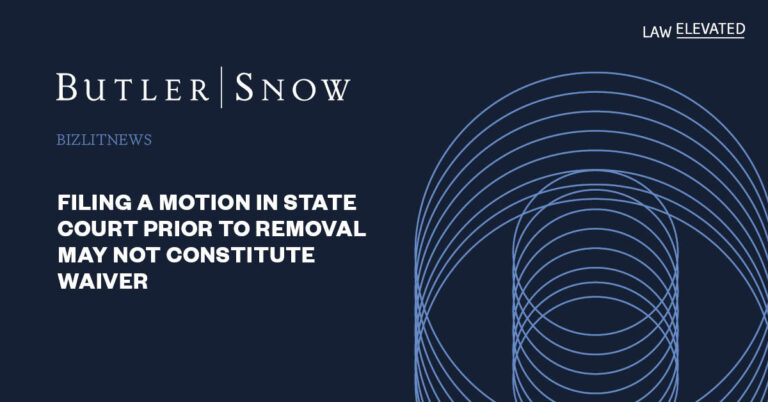In Abraham Watkins Nichols Agosto Aziz & Stogner v. Festeryga, No. 23-20337, 2025 WL 2621301 (5th Cir. Sept. 11, 2025), the plaintiff law firm sued its former associate attorney in Texas state court and sought a TRO and expedited discovery.
In an effort to stave off the discovery, the defendant filed a motion to dismiss (and did agree to a limited document production). He never set the motion to dismiss for hearing, and he then removed the action to federal court. The district court remanded the case, finding that filing the state court motion to dismiss prior to removal waived the right to remove the case to federal court.
The Fifth Circuit decision followed the case’s prior en banc decision in Abraham Watkins Nichols Agosto Aziz & Stogner v. Festeryga, 138 F.4th 252 (5th Cir. 2025), reversing In re Weaver, 610 F.2d 335, 337 (5th Cir. 1980), which had prohibited appeal of waiver-based remand orders. On return from the court’s en banc decision, the Fifth Circuit panel found:
No one disputes that [the defendant] removed within the 30-day statutory window. Yet the district court held that by filing a TCPA motion in state court and securing its automatic stay of discovery, he “reflect[ed] an intent to invoke the jurisdiction of the state court.”
….
Waiver, in our circuit, is no casual affair. A defendant’s intent to remain in state court must be “be clear and unequivocal,” and “the right of removal is not lost by action in the state court short of proceeding to an adjudication on the merits.” In practical terms, waiver occurs only when a defendant has “invok[ed] the jurisdiction of the state court in resolving the issues presented by the original complaint.” Anything less—mere procedural skirmishing—does not suffice.
….
This case illustrates why. [The defendant’s] TCPA motion—while potentially dispositive—could not be decided without a hearing, and it was his responsibility to set one. He never did. Filing a motion that sits idle is not the same as “submitt[ing] the cause to adjudication on the merits.” Other circuits agree: a dispositive motion, unaccompanied by a hearing or ruling, does not trigger waiver—particularly when, as with the TCPA, the motion carries collateral procedural effects (like staying discovery, expediting proceedings, or shifting burdens) apart from any merits decision. Defendants may have sound tactical reasons to file such a motion without any intent to seek a merits ruling. The district court therefore erred in treating Festeryga’s filing, standing alone, as “clear and unequivocal” waiver.
Festeryga, 2025 WL 2621301 at *3 (footnotes omitted).
Festeryga makes clear that one can add waiver-based remand orders to the very small category of remand orders that may be appealed in the Fifth Circuit.
